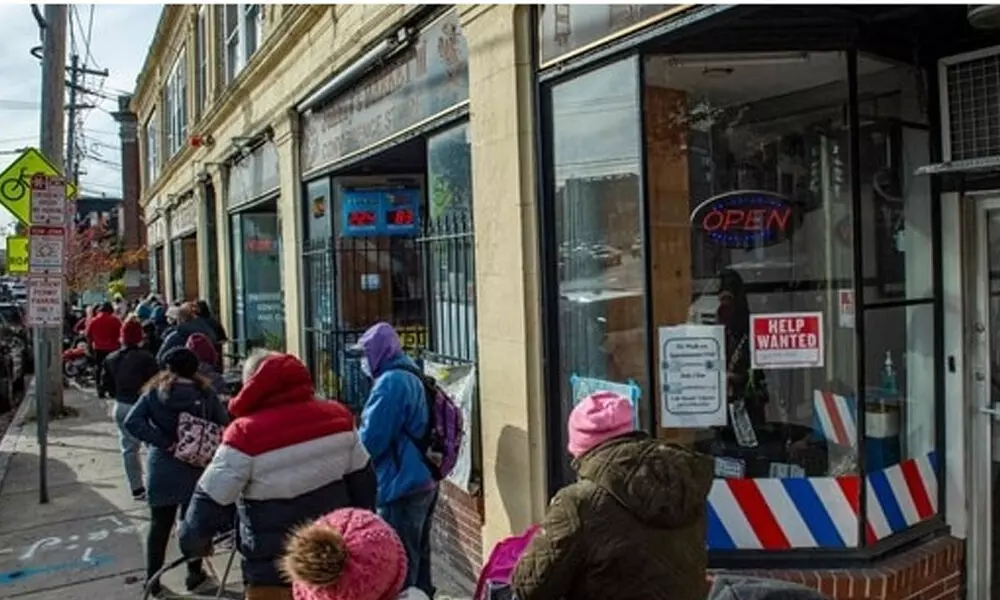US sees highest inflation of 6.8% in 40 years
The United States of America has seen the highest inflation rate in about 40 years – 6.8 per cent in November compared with a year earlier as increasing costs for food, energy, housing and other items left Americans experiencing their highest annual inflation rate in nearly four decades.
image for illustrative purpose

Hyderabad The United States of America has seen the highest inflation rate in about 40 years – 6.8 per cent in November compared with a year earlier as increasing costs for food, energy, housing and other items left Americans experiencing their highest annual inflation rate in nearly four decades.
Inflation has been causing a heavy burden to consumers, especially those with lower-income and particularly for everyday necessities. The higher wages that many workers have received has not given much happiness as a result. The Federal Reserve's plans to reduce its aid for the economy coincided with flagging public support for President Joe Biden, who has been taking steps to try to ease inflation pressures.
Giving fuel to the inflation has been a mix of factors resulting from the swift rebound from the pandemic recession: A flood of government stimulus, ultra-low rates engineered by the Fed and supply shortages at factories in the US and abroad.
Covid-related shutdowns and overwhelmed ports and freight yards have made the manufacturing companies slow down production, adding to it unexpected heavy customer demand.
The Labor Department has also reported that prices rose 0.8 per cent from October to November — a substantial increase, though slightly less than 0.9 per cent increase from September to October.
Employers, struggling with worker shortages, have also been raising pay, and many of them have increased prices to offset their higher labour costs, thereby adding to inflation.
The result has been price spikes for goods ranging from food and used vehicles to electronics, household furnishings and rental cars. The average price of a used vehicle rocketed nearly 28 per cent from November 2020 to last month, to a record $29,011.
The acceleration of prices, which began once the pandemic hit as Americans stuck at home flooded factories with orders for goods, has spread to services, from apartment rents and restaurant meals to medical services and entertainment. Even some retailers that built their businesses around the allure of ultra-low prices have begun boosting them.
The persistence of high inflation has surprised the Fed, whose chair, Jerome Powell, had for months characterised inflation as only "transitory," a short-term consequence of bottlenecked supply chains. Two weeks ago, though, Powell signaled a shift, implicitly acknowledging that high inflation has endured longer than he expected. He suggested that the Fed will likely act more quickly to phase out its ultra-low-rate policies than it had previously planned.
Some economists are holding out hope that inflation will peak in the coming months and then gradually ease and provide some relief for consumers. They note that supply shortages in some industries have begun to gradually ease. And while higher energy costs will continue to burden consumers in the coming months, Americans will likely be spared from earlier forecasts that energy prices would reach record highs over the winter.
Oil prices have been declining modestly and leading, in turn, to slightly lower gasoline prices. Even more dramatically, natural gas prices have plummeted nearly 40% from a seven-year high reached in October. The result is that while average home heating costs will well exceed last year's levels, they won't rise as much as had been feared. Food prices, too, could potentially ease as a result of sharp declines in corn and wheat prices from their highs earlier in the year.
What's more, the emergence of the omicron variant of the coronavirus has renewed the prospect of more canceled or postponed travel and fewer restaurant meals and shopping trips. All of that, if it happened, would slow consumer and business spending and potentially restrain inflation.

